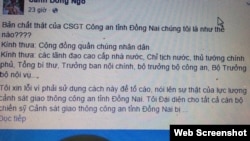A Vietnamese student and his friend have been sentenced to six months in prison for Facebook posts that advised drivers how to evade temporary traffic checkpoints in the northern city of Hai Phong.
The court this week found Nguyen Duc Hao, 21, and Tran Huy Lieu, 23, guilty of “illegally circulating information on the Internet,” four months after they were taken into custody.
Lawyer Tran Thu Nam said the sentencing is a “risky move.”
“They used Facebook for expressing their views," Nam said, adding that convicting them for the posts sets a dangerous precedent, and might violate their freedom of speech.
While the students were accused of “spreading defamatory content and tarnishing the image of police,” some residents in Hai Phong said the Facebook page exposed wrongdoing and helped people avoid traffic police who often hid in unexpected places to catch and fine violators.
According to official statistics, there are over 30 million Facebook users in Vietnam, and media expert Huynh Ngoc Chenh, former managing editor of Thanh Nien daily newspaper, said the social network is having a great impact in the Southeast Asian nation, where the press is under the government’s control.
“The government is struggling to manage the use of Facebook. Officials want to take a monopolistic role in providing information like in the past, and now when people can get access to impartial news and have the chance to give feedback [on Facebook], they are concerned,” Chenh said.
The sentencing came as authorities said they had identified three teenagers who posed as Islamic State militants to make threats and provoke terrorist acts on Facebook following the deadly attacks in Paris.
Facing intense scrutiny, the education and training department of the southern An Giang province last month was forced to retract an order that banned its teachers and students from liking and sharing contents related to policy, politics and religion, and deemed derogatory to others.
The media rights group Reporters Without Borders dubbed Vietnam “the enemy of Internet” for its online censorship and surveillance, but Hanoi denied the charge, saying universal rights of the people have been protected.
In an effort to reach out to the young and tech savvy population, the Vietnamese government in October launched its official page on Facebook. But observers say it appears that negative comments have been filtered.
Prime Minister Nguyen Tan Dung, at a ministerial meeting last year, urged government officials to embrace social networks to provide more accurate information in order to boost public confidence. At the same time, he urged the public to be highly responsible netizens.




